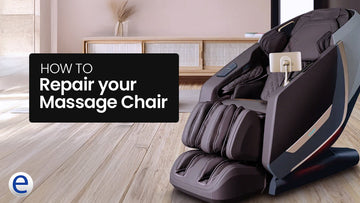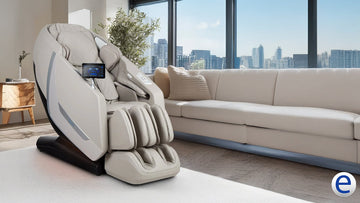Quick Troubleshooting Checklist
- Check power — make sure the outlet and surge protector work properly.
- Hard reset — unplug your chair for 5–10 minutes, then restart it.
- Inspect cables — look for loose, pinched, or disconnected cords.
- Test the remote — install new batteries (wireless) or confirm a snug connection (wired).
- Run calibration or body scan — this resets the roller alignment on most models.
After years of setting up and servicing massage chairs, I’ve learned that most breakdowns come down to simple issues — a loose connector, a tripped fuse, or a small calibration error. In this guide, I’ll show you how to troubleshoot problems step-by-step, what you can fix yourself, and when to call a professional to protect your warranty.
Safety First
- Always unplug your massage chair before inspecting internal parts.
- Keep your manual nearby — you can download copies for Ogawa, Osaki, Luraco, or Infinity.
- Take photos before removing panels so you can reassemble them easily.
Common Problems and Easy Fixes
- Try a different outlet or surge protector and make sure the power switch on the back of the chair is on.
- Look for a reset switch or inline fuse near the power cord — this is a common cause of sudden shut-offs.
- If your chair stopped mid-session, wait 10–15 minutes. Many models include a built-in thermal cutoff that resets automatically after cooling.
- If the remote freezes, unplug the chair for five minutes, then reconnect it to reset the interface.
- Wireless remotes may need new batteries or re-pairing — check your owner’s manual for the pairing steps.
- For wired remotes, inspect the plug for bent pins or a loose connection at the side panel.
- Run a “Restore” or “Initialize” program to return the rollers to their default home position.
- Perform a full body scan or calibration reset to realign the rollers with your back profile.
- Inspect the track for small obstructions like earbuds or debris that can jam the mechanism.
- Listen for the air pump running. If it’s silent, the connector may have come loose or detached internally.
- Follow the air tubes from the pump to the bladders, reseating any pinched or disconnected lines.
- Many premium chairs use modular air bladders that can be replaced easily without tools.
- Tighten visible screws on the panels and back frame using a screwdriver or hex key.
- Apply a small amount of manufacturer-approved lubricant on moving joints — never use WD-40.
- Placing a rug or mat under the chair can also reduce floor vibration and noise resonance.
- Ensure all cables under the ottoman are firmly connected to their ports and sensors.
- Wipe down the extending rails and guide wheels to clear dust or debris that may cause jamming.
- Run the leg-length auto-adjust program to recalibrate the sensors for your height.
DIY vs Professional Repair
| Repair Task | DIY Friendly | Professional Service |
|---|---|---|
| Loose screws or rattling panels | ✅ Yes — tighten with a screwdriver or hex key. | Not needed unless internal frame is damaged. |
| Remote or power cord replacement | ✅ Simple to replace using OEM parts. | Required only for internal wiring issues. |
| Recalibration or body scan reset | ✅ Run from your chair’s menu or settings panel. | Not required unless the rollers are misaligned. |
| Airline reseat or bladder swap | ✅ Possible if your model uses modular bladders. | Needed if the air pump or manifold fails. |
| Motor or pump failure | ❌ Not recommended — internal parts and wiring involved. | ✅ Covered under most warranties (3–5 years). |
| Control board or electronics | ❌ Requires professional diagnostics and replacement. | ✅ Contact your brand or retailer for service. |
| Recurring error codes or sensor faults | ❌ Basic resets may help temporarily. | ✅ Schedule a technician to inspect the cause. |
Warranty Tip: Many high-end brands include 3–5 years of in-home parts and labor. Always contact warranty support before attempting major repairs — opening electronics can void your coverage.
Preventive Maintenance (Avoid Repairs Before They Start)
- Dust vents and sensors monthly; wipe down upholstery and rails regularly.
- Always use a surge protector to prevent electrical damage.
- Avoid liquids near the controller or seams; clean spills immediately.
- Once a year, unplug the chair for 15 minutes, run a full calibration, and inspect cables and tubing.
- Keep your original packaging in case you ever need to ship the chair for service.
Parts and Support: Why Brand Matters
One of the biggest differences between premium and off-brand chairs is long-term support. Reputable manufacturers keep replacement parts in stock for years and design their chairs for easier maintenance. Cheap imports, on the other hand, often lack spare parts or responsive customer service.
- Choose trusted brands like Ogawa, Osaki, Infinity, and Luraco.
- Be cautious of “budget” models that lack U.S.-based repair centers or parts availability.
Avoid These Common Mistakes
- Never open the control board or touch high-voltage wiring — that’s for certified technicians only.
- Don’t ship the entire chair unless warranty support instructs you to — most brands send technicians to your home.
- Read warranty fine print carefully. “Lifetime” coverage often excludes electronics and labor costs.
Helpful Resources
Trusted Medical Sources
Still stuck? Request a free troubleshooting session →




